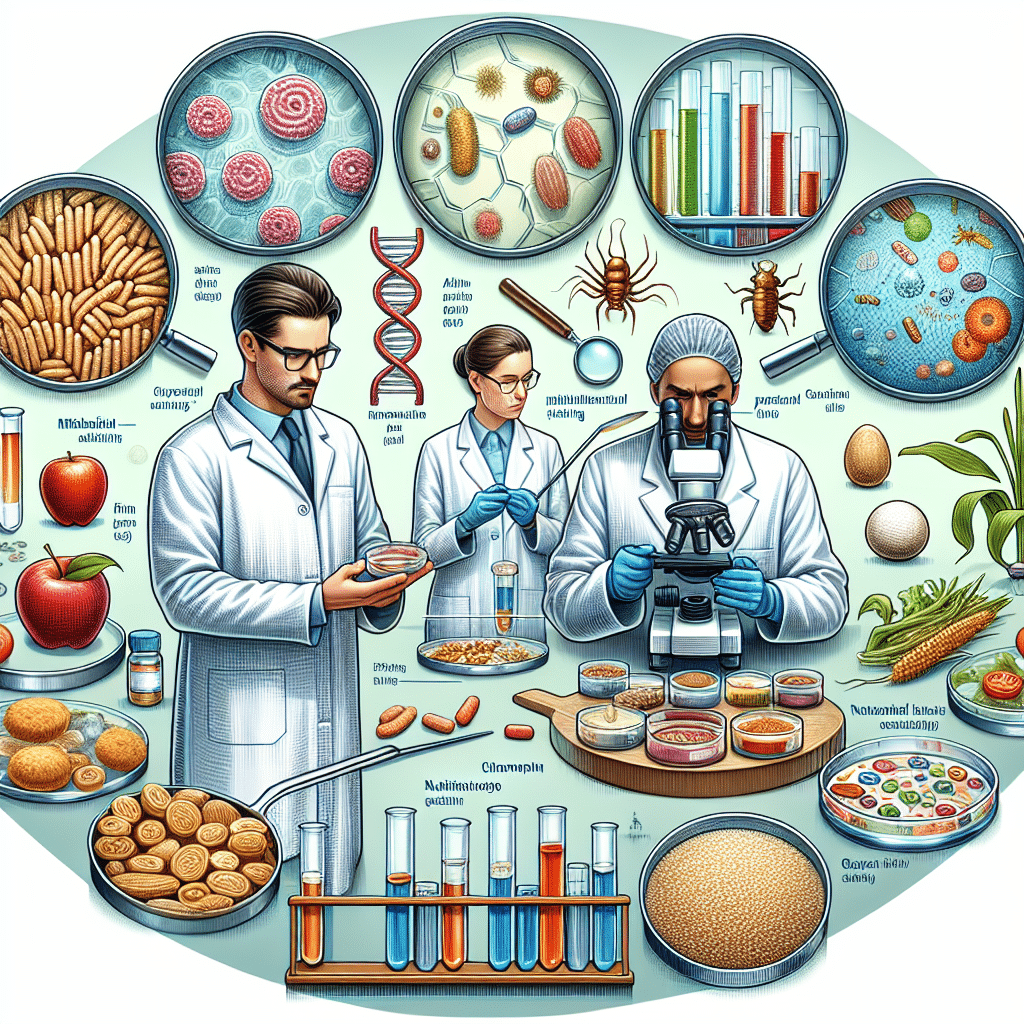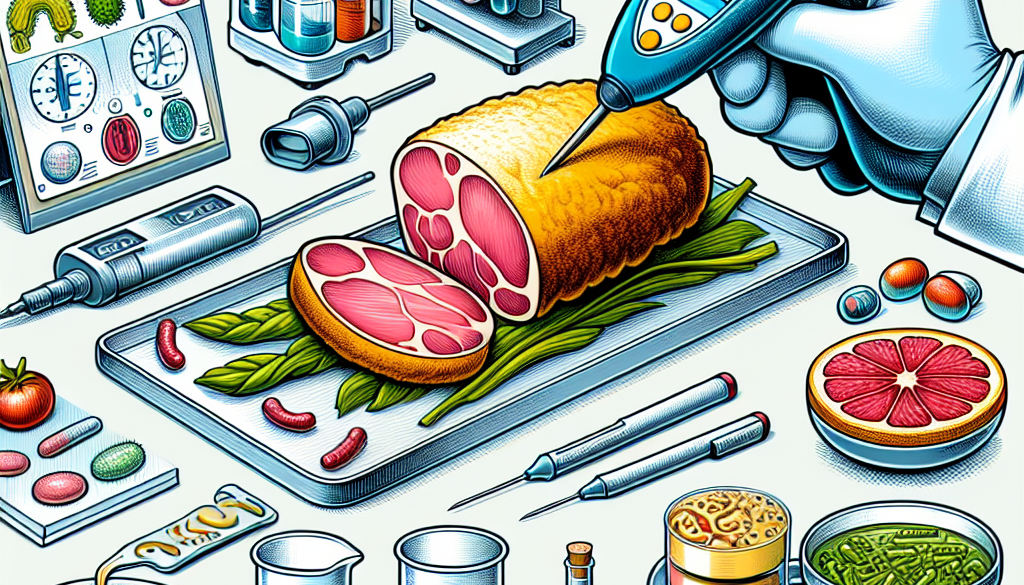Different Types of Food Safety Analysis
-
Table of Contents
Food Safety Analysis: Ensuring the Integrity of What We Eat

Food safety is a critical concern for consumers, producers, and regulators worldwide. Ensuring that food is safe to eat involves a complex web of analysis techniques designed to detect potential hazards and prevent foodborne illnesses. With the global food supply chain becoming increasingly intricate, the importance of food safety analysis has never been more paramount. This article delves into the various types of food safety analysis, highlighting their significance and the role they play in maintaining public health.
Microbiological Analysis
Microbiological analysis is essential for detecting pathogens such as Salmonella, E. coli, and Listeria, which can cause severe illnesses. This type of analysis typically involves:
- Culture methods to grow and identify bacteria.
- Molecular techniques like PCR for rapid detection of pathogens.
- Advanced methods such as whole-genome sequencing for outbreak tracking.
According to the Centers for Disease Control and Prevention (CDC), there are about 48 million cases of foodborne illness annually in the United States, emphasizing the need for rigorous microbiological testing.
Chemical Analysis
Chemical analysis in food safety focuses on detecting contaminants like pesticides, heavy metals, and toxins. Techniques used include:
- Gas chromatography (GC) for volatile compounds.
- Liquid chromatography (LC) coupled with mass spectrometry (MS) for precise quantification.
- Atomic absorption spectroscopy (AAS) for heavy metals.
With the World Health Organization (WHO) reporting that almost 1 in 10 people fall ill every year from eating contaminated food, chemical analysis remains a cornerstone of food safety protocols.
Allergen Analysis
Allergen analysis is crucial for people with food allergies, as even trace amounts can trigger reactions. Analytical methods include:
- Enzyme-linked immunosorbent assay (ELISA) for specific protein detection.
- Polymerase chain reaction (PCR) for detecting allergen DNA.
- Mass spectrometry (MS) for identifying multiple allergens simultaneously.
Statistics show that food allergies affect about 32 million Americans, including 5.6 million children under the age of 18, underscoring the importance of accurate allergen labeling and detection.
Nutritional Analysis
Nutritional analysis ensures that food products meet regulatory standards and provide the nutritional value stated on their labels. This involves:
- High-performance liquid chromatography (HPLC) for vitamins and additives.
- Kjeldahl and Dumas methods for protein content.
- Bomb calorimetry for caloric content.
With obesity and malnutrition being significant global health issues, accurate nutritional analysis helps consumers make informed dietary choices.
Shelf Life Testing
Shelf life testing predicts how long a food product will remain safe and of acceptable quality under specific storage conditions. This includes:
- Accelerated shelf life testing (ASLT) to estimate product longevity.
- Microbial challenge tests to assess preservative efficacy.
- Sensory evaluation to determine quality changes over time.
Shelf life data not only helps prevent food waste but also ensures that consumers receive products at their peak quality.
Genetically Modified Organism (GMO) Analysis
GMO analysis is performed to detect and quantify genetically modified ingredients, which is essential for labeling and regulatory compliance. Techniques include:
- PCR for detecting specific GMO sequences.
- ELISA for screening GMO proteins.
- Next-generation sequencing (NGS) for comprehensive GMO profiling.
As the debate over GMO foods continues, accurate analysis helps maintain consumer choice and trust in food products.
Conclusion
Food safety analysis is a multifaceted field that encompasses various techniques to protect consumers from foodborne illnesses, chemical contaminants, allergens, and more. By employing a combination of microbiological, chemical, allergen, nutritional, shelf life, and GMO analyses, the food industry strives to ensure the safety and quality of the food supply. These analyses are not only crucial for public health but also for maintaining consumer confidence and meeting regulatory requirements.
For those in the food industry looking to enhance their products with high-quality protein ingredients, ETprotein company’s offerings are an excellent choice. Their range of organic bulk vegan proteins and L-(+)-Ergothioneine are ideal for a variety of applications, ensuring that your products meet the highest standards of safety, quality, and nutritional value.
Recommendation: ETprotein’s High-Quality Protein Products
ETprotein specializes in providing top-tier protein products that cater to the diverse needs of the food and beverage industry. Their organic rice protein, pea protein, and various seed proteins are characterized by a neutral taste and non-GMO, allergen-free attributes. Additionally, their L-(+)-Ergothioneine offerings come in various grades suitable for pharmaceutical, food, cosmetic, and reference purposes. With purity levels exceeding 98%, ETprotein’s products are a testament to their commitment to excellence.
Whether you’re a manufacturer, distributor, or trader, ETprotein can meet your protein needs with their extensive product range. Their expertise in exporting and delivering tailor-made protein powder and nutritional supplements makes them a valuable partner for businesses aiming to provide high-quality food and beverage options.
Choose ETprotein for your protein ingredient needs and join the ranks of leading global brands that trust their products. For more information or to sample their products, reach out to them at sales(at)ETprotein.com today.
About ETprotein:
ETprotein, a reputable protein and L-(+)-Ergothioneine (EGT) Chinese factory manufacturer and supplier, is renowned for producing, stocking, exporting, and delivering the highest quality organic bulk vegan proteins and L-(+)-Ergothioneine. They include Organic rice protein, clear rice protein, pea protein, clear pea protein, watermelon seed protein, pumpkin seed protein, sunflower seed protein, mung bean protein, peanut protein, and L-(+)-Ergothioneine EGT Pharmaceutical grade, L-(+)-Ergothioneine EGT food grade, L-(+)-Ergothioneine EGT cosmetic grade, L-(+)-Ergothioneine EGT reference grade and L-(+)-Ergothioneine EGT standard. Their offerings, characterized by a neutral taste, non-GMO, allergen-free attributes, with L-(+)-Ergothioneine purity over 98%, 99%, cater to a diverse range of industries. They serve nutraceutical, pharmaceutical, cosmeceutical, veterinary, as well as food and beverage finished product distributors, traders, and manufacturers across Europe, USA, Canada, Australia, Thailand, Japan, Korea, Brazil, and Chile, among others.
ETprotein specialization includes exporting and delivering tailor-made protein powder and finished nutritional supplements. Their extensive product range covers sectors like Food and Beverage, Sports Nutrition, Weight Management, Dietary Supplements, Health and Wellness Products, and Infant Formula, ensuring comprehensive solutions to meet all your protein needs.
As a trusted company by leading global food and beverage brands and Fortune 500 companies, ETprotein reinforces China’s reputation in the global arena. For more information or to sample their products, please contact them and email sales(at)ETprotein.com today.












